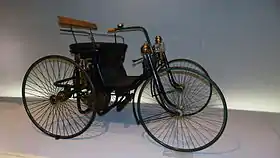| Stahlradwagen ("steel-wheeled car") | |
|---|---|
 Daimler Stahlradwagen, 1889 | |
| Overview | |
| Manufacturer | Gottlieb Daimler |
| Production | 1889 |
| Assembly | Canstatt, Germany |
| Designer | Wilhelm Maybach |
| Body and chassis | |
| Layout | MR layout[1] |
| Powertrain | |
| Engine | IOE 16° V-twin engine, 565 cc[2][3] |
| Transmission | 4-speed manual[1][4] |
The Stahlradwagen (or "steel-wheeled car")[5] was Gottlieb Daimler's second motor car.[1]
After seeing Panhard's Daimler-designed V-twin engine demonstrated at the Paris Exposition of 1889 and inquiring into the engine's weight and power, Armand Peugeot expressed his interest in a lightweight motor vehicle powered by the engine. Daimler worked with Wilhelm Maybach to develop the vehicle.[6] The tubular steel frame resembled two bicycles joined side by side and was made by bicycle manufacturer Neckarsulmer Stahlfabriken, which would later become part of NSU Motorenwerke.[1][6] Water, to cool the engine, was run through the tubular frame.[7]
The Stahlradwagen was demonstrated toward the end of the 1889 Exposition.[4][8] Peugeot began building cars based on the Stahlradwagen design by 1890.[3][7]
Notes
- 1 2 3 4 Posthumus 1977, p. 13.
- ↑ Dick 2005, pp. 13–14.
- 1 2 Eckermann 2001, p. 33.
- 1 2 Dick 2005, p. 16.
- ↑ Luikens & Hedberg 2008, p. 9.
- 1 2 Dick 2005, pp. 15–16.
- 1 2 Posthumus 1977, p. 16.
- ↑ Posthumus 1977, p. 14.
References
- Dick, Robert (2005). "2 — Meeting Point: Eiffel Tower". Mercedes and Auto Racing in the Belle Époque: 1895 - 1915. Jefferson, NC USA: McFarland. pp. 13–16. ISBN 0-7864-1889-3. Retrieved 2013-06-04.
- Eckermann, Erik (2001) [1989]. "The Pioneering Era and Coming of Age — 1885 -to 1918". Vom Dampfwagen zum Auto [World History of the Automobile]. Peter L. Albrecht, translator (English ed.). Warrendale, PA USA: Society of Automotive Engineers. pp. 32–33. ISBN 0-7680-0800-X. Retrieved 2013-06-05.
- Luikens, Jim; Hedberg, Mary M. (2008). "History". Standard Catalog Of Mercedes-Benz. Iola, WI USA: Krause Publications. p. 9. ISBN 978-0-89689-703-8. LCCN 2008928410. Retrieved 2013-06-05.
Displayed at the 1889 World's Fair in Paris, their creation was called the Stahlradwagen (steel-wheeled car).
- Posthumus, Cyril (1977) [1977]. The story of Veteran & Vintage Cars. John Wood, illustrator (Phoebus 1977 ed.). London: Hamlyn / Phoebus. pp. 13, 14, 16. ISBN 0-600-39155-8.